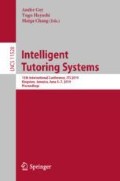Abstract
The Hint Factory is a method of automatic hint generation that has been used to augment hints in a number of educational systems. Although the previous implementations were done in domains with largely deterministic environments, the methods are inherently useful in stochastic environments with uncertainty. In this work, we explore the game Connect Four as a simple domain to give decision support under uncertainty. We speculate how the implementation created could be extended to other domains including simulated learning environments and advanced navigational tasks.
Access this chapter
Tax calculation will be finalised at checkout
Purchases are for personal use only
References
Aleven, V., McLaren, B., Roll, I., Koedinger, K.: Toward tutoring help seeking. In: Lester, J.C., Vicari, R.M., Paraguaçu, F. (eds.) ITS 2004. LNCS, vol. 3220, pp. 227–239. Springer, Heidelberg (2004). https://doi.org/10.1007/978-3-540-30139-4_22
Aleven, V., McLaren, B.M., Sewall, J., Koedinger, K.R.: The cognitive tutor authoring tools (CTAT): preliminary evaluation of efficiency gains. In: Ikeda, M., Ashley, K.D., Chan, T.-W. (eds.) ITS 2006. LNCS, vol. 4053, pp. 61–70. Springer, Heidelberg (2006). https://doi.org/10.1007/11774303_7
Allis, L.V.: A knowledge-based approach of connect-four. Vrije Universiteit, Subfaculteit Wiskunde en Informatica (1988)
Anggara, K.: Connect Four (2018). https://doi.org/10.5281/zenodo.1254572
Barnes, T., Stamper, J., Croy, M.: Using Markov decision processes for automatic hint generation. In: Handbook of Educational Data Mining, 467 (2011)
Edelkamp, S., Kissmann, P.: Symbolic classification of general two-player games. In: Dengel, A.R., Berns, K., Breuel, T.M., Bomarius, F., Roth-Berghofer, T.R. (eds.) KI 2008. LNCS (LNAI), vol. 5243, pp. 185–192. Springer, Heidelberg (2008). https://doi.org/10.1007/978-3-540-85845-4_23
Edwards, W.: The theory of decision making. Psychol. Bull. 51(4), 380 (1954)
Koedinger, K.R., Stamper, J.C., McLaughlin, E.A., Nixon, T.: Using data-driven discovery of better student models to improve student learning. In: Lane, H.C., Yacef, K., Mostow, J., Pavlik, P. (eds.) AIED 2013. LNCS (LNAI), vol. 7926, pp. 421–430. Springer, Heidelberg (2013). https://doi.org/10.1007/978-3-642-39112-5_43
Mosley, P., Kline, R.: Engaging students: a framework using lego robotics to teach problem solving. Inf. Technol. Learn. Perform. J. 24(1), 39–45 (2006)
Paquette, L., Lebeau, J.-F., Beaulieu, G., Mayers, A.: Automating next-step hints generation using ASTUS. In: Cerri, S.A., Clancey, W.J., Papadourakis, G., Panourgia, K. (eds.) ITS 2012. LNCS, vol. 7315, pp. 201–211. Springer, Heidelberg (2012). https://doi.org/10.1007/978-3-642-30950-2_26
Razzaq, L., Heffernan, N.T.: Hints: is it better to give or wait to be asked? In: Aleven, V., Kay, J., Mostow, J. (eds.) ITS 2010. LNCS, vol. 6094, pp. 349–358. Springer, Heidelberg (2010). https://doi.org/10.1007/978-3-642-13388-6_39
Rivers, K.: Automated Data-Driven Hint Generation for Learning Programming (2017)
Shih, B., Koedinger, K.R., Scheines, R.: A response time model for bottom-out hints as worked examples. In: Handbook of Educational Data Mining, pp. 201–212 (2011)
Stamper, J.C., Eagle, M., Barnes, T., Croy, M.: Experimental evaluation of automatic hint generation for a logic tutor. In: Biswas, G., Bull, S., Kay, J., Mitrovic, A. (eds.) AIED 2011. LNCS (LNAI), vol. 6738, pp. 345–352. Springer, Heidelberg (2011a). https://doi.org/10.1007/978-3-642-21869-9_45
Stamper, J., Barnes, T., Croy, M.: Enhancing the automatic generation of hints with expert seeding. Int. J. AI Educ. 21(1–2), 153–167 (2011b)
Stamper, J., et al.: PSLC DataShop: a data analysis service for the learning science community. In: Aleven, V., Kay, J., Mostow, J. (eds.) ITS 2010. LNCS, vol. 6095, p. 455. Springer, Heidelberg (2010). https://doi.org/10.1007/978-3-642-13437-1_112
Stamper, J., Barnes, T., Lehmann, L., Croy, M.: The hint factory: Automatic generation of contextualized help for existing computer aided instruction. In: 9th International Conf on Intelligent Tutoring Systems Young Researchers Track, pp. 71–78 (2008)
Stamper, J.C., Barnes, T., Croy, M.: Extracting student models for intelligent tutoring systems. In: Proceedings of the National Conference on Artificial Intelligence, vol. 22, no. 2, p. 1900. AAAI Press; MIT Press, 1999 (2007)
Stamper, J.: Automating the generation of production rules for intelligent tutoring systems. In: Proceedings of the 9th International Conference on Interactive Computer Aided Learning (ICL 2006). Kassel University Press (2006)
Sutton, R., Barto, A.: Reinforcement Learning. The MIT Press, Cambridge (1998)
Thill, M., Koch, P., Konen, W.: Reinforcement learning with N-tuples on the game connect-4. In: Coello, C.A.C., Cutello, V., Deb, K., Forrest, S., Nicosia, G., Pavone, M. (eds.) PPSN 2012. LNCS, vol. 7491, pp. 184–194. Springer, Heidelberg (2012). https://doi.org/10.1007/978-3-642-32937-1_19
Tsovaltzi, D., et al.: Extending a virtual chemistry lab with a collaboration script to promote conceptual learning. Int. J. Technol. Enhanc. Learn. 2(1–2), 91–110 (2010)
Author information
Authors and Affiliations
Corresponding author
Editor information
Editors and Affiliations
Rights and permissions
Copyright information
© 2019 Springer Nature Switzerland AG
About this paper
Cite this paper
Moore, S., Stamper, J. (2019). Decision Support for an Adversarial Game Environment Using Automatic Hint Generation. In: Coy, A., Hayashi, Y., Chang, M. (eds) Intelligent Tutoring Systems. ITS 2019. Lecture Notes in Computer Science(), vol 11528. Springer, Cham. https://doi.org/10.1007/978-3-030-22244-4_11
Download citation
DOI: https://doi.org/10.1007/978-3-030-22244-4_11
Published:
Publisher Name: Springer, Cham
Print ISBN: 978-3-030-22243-7
Online ISBN: 978-3-030-22244-4
eBook Packages: Computer ScienceComputer Science (R0)

